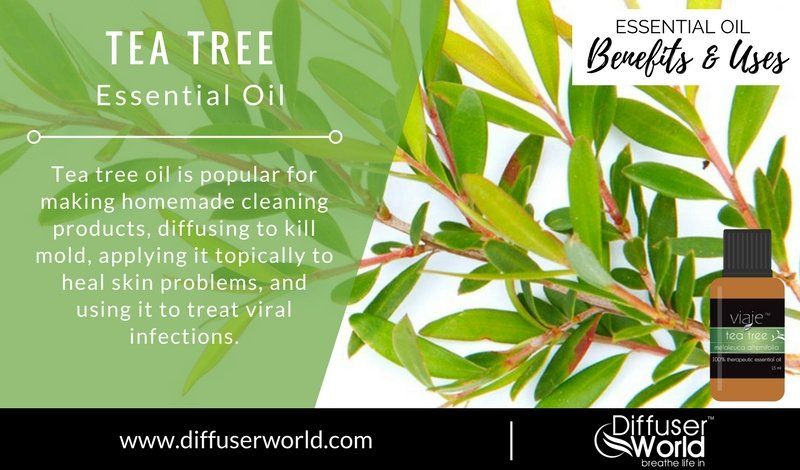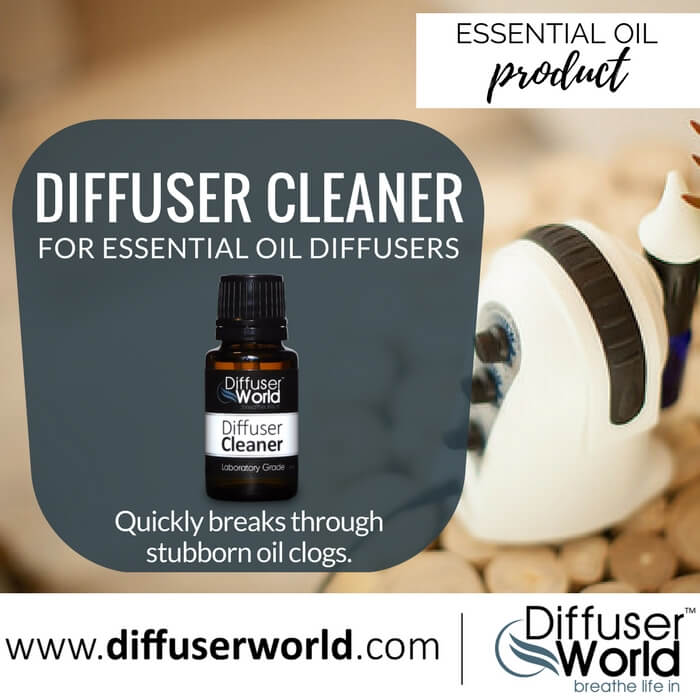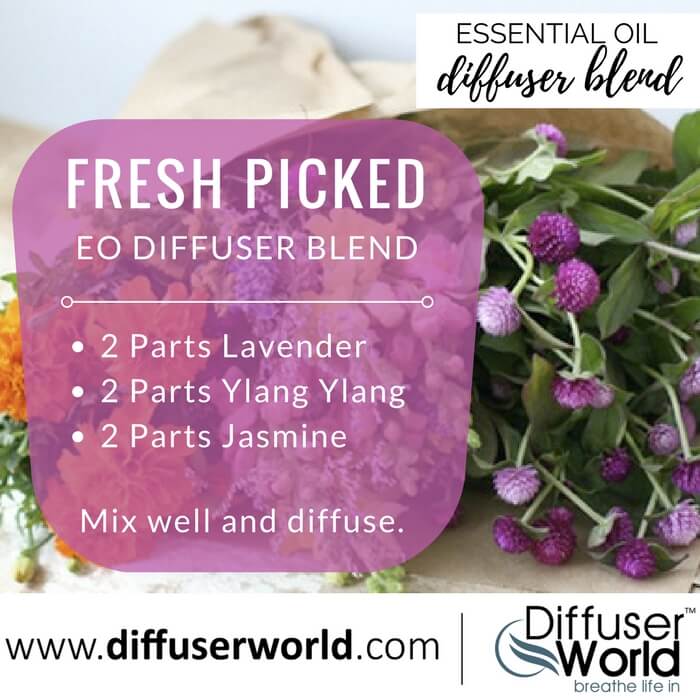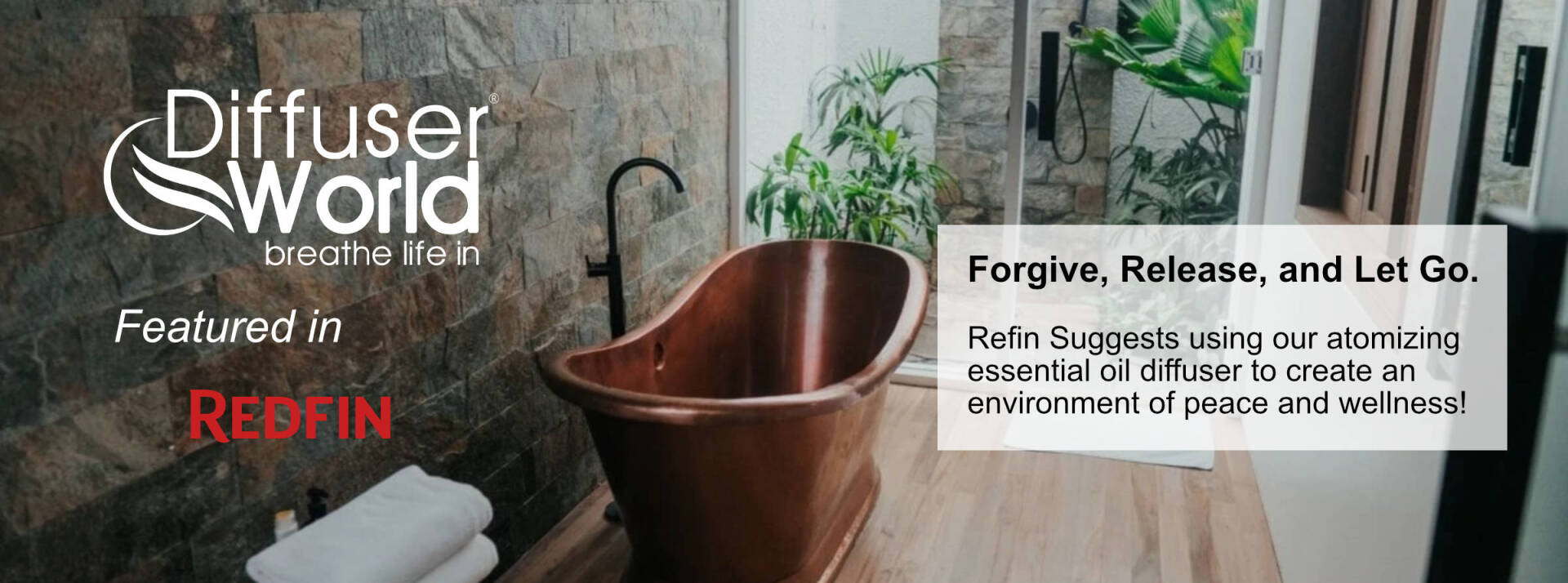Tea Tree Essential Oil Uses and Benefits

Tea tree essential oil, also known as melaleuca, is distinguished for its strong antiseptic properties and ability to treat wounds. Tea tree oil (TTO), the volatile essential oil derived mainly from the Australian native plant Melaleuca alternifolia has been extensively used throughout Australia for at least the past 100 years. And for over seven decades, it’s been documented in several medical studies to kill many strains of bacteria, viruses and fungi.
Tea tree essential oil uses and benefits are plentiful: making homemade cleaning products, diffusing it in the air with a cold air diffuser to kill mold, applying it topically to heal skin problems and using it to treat viral infections. It’s becoming an increasingly popular active ingredient in a variety of household and cosmetic products; including face wash, shampoos, conditioners, massage oils, skin and nail lotions and laundry detergents. Tea tree’s natural antiseptic and anti-inflammatory actions make it an essential oil that should truly be part of everyone’s all-natural medicine cabinet.
Tea Tree Essential Oil Benefits
Records show that tea tree essential oil has been used for thousands of years by some indigenous people. Thankfully today science is finally catching up and describing why tea tree oil is so effective. To date, over 327 scientific studies refer to tea tree oil’s antimicrobial prowess alone.
Uses for tea tree essential oil
- Acne
- Bacterial infections
- Chickenpox
- Cold sores
- Congestion and respiratory tract infections
- Earaches
- Fungal infections (especially Candida, jock itch, athlete’s foot and toenail fungus)
- Halitosis (bad breath)
- Head lice
- MRSA
- Psoriasis
- Dry cuticles
- Itchy insect bites, sores and sunburns
- Boils from staph infections
Household uses of tea tree essential oil that can replace store-bought products
- Anti-microbial laundry freshener
- Insect repellant
- Natural deodorant
- Acne face wash
- Removes foot order
- Removes mold
- Household cleaner
In many cases, doctors of functional medicine will prescribe essential oils like tea tree oil and oregano oil in replacement of conventional medications because they’re just as effective and without the adverse side effects. An article published in the Journal of Phytomedicine evaluated the relationship between various essential oils and found that none (including tea tree) caused adverse reactions when taken with several different antibiotics. In fact, they discovered that some essential oils even had a positive synergistic effect, meaning they could help prevent antibiotic resistance from developing!
Top Tea Tree Essential Oil Uses
Ready to use tea tree essential oil to renovate your health? Here are the top uses for tea tree oil for natural cures and home remedies.
Tea Tree Essential Oil for Acne
One of the most common uses for tea tree essential oil today is in skin care products, as it’s considered one of the most effective home remedies for acne. One study found tea tree oil to be just as effective as benzoyl peroxide, but without the associated negative side effects that many people experience including red, dried and peeling skin.
You can make a homemade gentle tea tree essential oil acne face wash by mixing five drops of pure tea tree essential oil with two teaspoons of raw honey. Simply rub on your face, leave on for one minute, then rinse off.
Tea Tree Essential Oil for Hair
Tea tree essential oil has proven very beneficial for the health of your hair and scalp. Like coconut oil for hair, tea tree essential oil has the ability to soothe dry flaking skin, remove dandruff and even can be used for the treatment of lice. To make homemade tea tree essential oil shampoo, mix several drops of tea tree essential oil with aloe vera gel, coconut milk, and other essential oils like tea tree essential oil.
Tea Tree Essential Oil for Cleaning
Another fantastic way to use tea tree essential oil is as a household cleaner. Tea tree oil has powerful antimicrobial properties and can kill off bad bacteria in your home. To make homemade a tea tree oil cleanser, mix with water, vinegar and lemon essential oil then use it on your counter tops, kitchen appliances, shower, toilet and sinks.
Tea Tree Essential Oil for Psoriasis and Eczema
Tea tree essential oil can help relieve any type of skin inflammation, including being used as a natural eczema treatment and for reducing psoriasis. Simply mix one teaspoon coconut oil, five drops of tea tree oil and five drops of lavender essential oil to make homemade tea tree oil eczema lotion or body soap.
Tea Tree Essential Oil for Toenail Fungus and Ringworm
Because of its ability to kill parasites and fungal infections, tea tree oil is a great choice to use on toenail fungus, athlete’s foot and ringworm. Put tea tree oil undiluted on the affected area using a clean cotton swab. And for stubborn fungi, consider mixing it with natural anti-fungal oil of oregano. Tea tree essential oil has also been proven beneficial for treating and removing warts, so simply put tea tree oil directly on the area for 30 days once or twice daily.
Tea Tree Essential Oil Kills Mold
A common problem many people experience in their homes is mold infestation, oftentimes without even being aware of it. Consider buying an atomizing essential oil diffuser and diffusing tea tree oil in the air around your home to kill mold and other bad bacteria. Also, you can spray tea tree essential oil cleaner onto shower curtains, your laundry machine, dishwasher or toilet to kill off mold.
It’s been proven that diffusing essential oils with a cold air atomizing diffuser is the best solution to address mold growing in your environment. Essential oils are the best option for addressing mold issues. Using all natural, 100% organic, safe, and effective therapeutic grade essential oils is the best non-toxic solution currently available. See a natural solution for removing toxic mold.
Tea Tree Essential Oil Deodorant
Another great reason to use tea tree essential oil is to eliminate body odor. Tea tree oil has antimicrobial properties that destroy the bacteria on your skin that causes body odor. You can make homemade tea essential tree oil deodorant by mixing it with coconut oil and baking soda. Also, if your kids play sports or if you’re a runner, you can add tea tree essential oil and lemon essential oil to your shoes and sports gear to keep them smelling fresh!
Tea Tree Essential Oil for Infections and Cuts
Tea tree essential oil mixed with lavender essential oil is the perfect ingredient in a homemade wound ointment. Make sure to clean a cut first with water and hydrogen peroxide if necessary, then put on tea tree oil and cover with a bandage to help fight off infections. A study published in the Journal of Investigative Dermatology even found tea tree oil helps kills MRSA and staph infections.
Tea Tree Essential Oil Toothpaste for Oral Health
Because of tea tree oil’s ability to kill off bad bacteria and at the same time soothe inflamed skin, it’s a perfect ingredient in homemade toothpaste and mouthwash. It’s been shown to reduce the bleeding of gums and tooth decay. Simply mix tea tree oil with coconut oil and baking soda for an amazing homemade toothpaste.
Tea Tree Essential Oil Research and Studies
Historically tea tree plants’ volatile essential oils (Melaleuca alternifolia) have been capitalized on most for their antiseptic and anti-inflammatory actions. The Melaleucagenus belongs to the Myrtaceae family and contains approximately 230 plant species, almost all of which are native to Australia. A 2006 report published by The School of Biomedical and Chemical Sciences at The University of Western Australia stated that tea tree’s primary active ingredients responsible for its ability to reduce harmful bacteria include terpene hydrocarbons, monoterpenes and sesquiterpenes.
After examining over 800 tea tree samples by gas chromatography, the researchers observed more than 100 different chemical components and various ranges of concentrations. These volatile hydrocarbons are considered aromatic and capable of traveling through air, pores of the skin and mucus membranes.
In 1923, Dr. A.R. Penfold found that tea tree oil was TWELVE times more effective at healing infections than the conventional antiseptic (carbolic acid) at that time; and during the 1930s-40s, tea tree oil was known as the go-to antiseptic for Australian World War II soldiers who were given tea tree oil in their first aid kits.
One of the most incredible studies done recently done on tea tree oil investigated its ability to fight skin cancer. In a study published in the Journal of Dermatological Sciences, tea tree oil was found to have a rapid effect on reducing cancerous tumors and boosting immunity.
How to Use Tree Essential Oil
Aromatically: Diffuse tea tree oil throughout your home using an oil diffuser. You can also directly inhale the oil by sniffing it right out of the bottle or applying some to your skin and clothes and smelling it that way, similar to a perfume.
Topically: You should always dilute tea tree oil with a carrier oil like coconut oil in a 1:1 ratio before applying it directly to skin. Similarly to tea tree, coconut oil also has its own long list of benefits for skin and immunity, so these two together make an even better combination.
NOT for Internal Use: According to the National Poison Center, tea tree oil is known to be poisonous if swallowed. Tea tree oil should NOT be taken by mouth for any reason, even though some traditional uses include tea tree oil as a mouthwash, treatment for bad breath, and treatment of toothache and mouth ulcers. If using tea tree in your mouth, spit out the oil afterwards to prevent potential side effects like digestive issues, hives or dizziness.
Always look for 100% pure essential oils and check that the correct species name is listed on the bottle’s label (Melaleuca alternifolia). Ideally look for oil that’s therapeutic grade and organic, which ensures it’s been tested and meets all criteria, plus it will be free from chemical toxins, fillers or solvents. The composition of tea tree oils sold are regulated by an international standard for “Oil of Melaleuca—terpinen-4-ol type,” which sets minimum and maximum standards for 14 active components of the oil. Six common varieties, or chemotypes, of M. alternifolia are normally sold as tea tree essential oil, but to date no obvious differences in their bioactivity or effectiveness have been found, therefore all seem like good choices.
Light, heat, exposure to air, and moisture all affect oil stability of essential oils, so keep your tree oil stored in dark, cool, dry conditions preferably in a glass container.
Side Effects of Tea Tree Essential Oil
Tea tree essential oil is generally considered safe and doesn’t cause side effects in most cases. However if you have sensitive skin, it’s possible that you might experience a reaction. Keep tea tree essential oil away from your eyes, contact lenses, inner nose, and sensitive parts of your skin. This essential oil possesses a sharp camphoraceous odor followed by a menthol-like cooling sensation which can make your skin feel like it’s slightly burning if you apply too much.
When used in topical products at a concentration of 5% to 10% it normally doesn’t cause allergies or skin rashes, but stronger concentration have been reported to cause dermatitis reactions. In 1999, tea tree essential oil was added to the North American Contact Dermatitis Group screening panel and test results showed that about 1.4% of patients referred for patch testing had a positive reaction to tea tree oil. It’s always a good idea to do a small skin patch test first on your arm or leg to make sure you don’t have a negative reaction before using larger amounts or applying it to your face, chest or neck.
DIY Tea Tree Essential Oil Recipes
Homemade Melaleuca Lemon Household Cleaner
Most commercially sold cleaners are made with synthetic fragrances and harmful chemicals. This Homemade Melaleuca Lemon Household Cleaner is just as effective thanks to tea tree’s antimicrobial properties. It’s made with only 4 ingredients, is easy and fast to make, plus it will leave behind a naturally refreshing aroma.
Total Time: 2 minutes / Serves: 30-90
INGREDIENTS:
- 8 oz water
- 4 oz distilled white vinegar
- 15 drops tea tree essential oil
- 15 drops lemon
- Glass Cleaning Spray bottle
DIRECTIONS:
- Fill spray bottle with ingredients. Close bottle and shake to mix.
- Swirl/shake bottle before each spray.
Note: Citrus essentials oils are highly concentrated and are full of healthy acidic properties! Because of this, we recommend you use glass containers when storing them so they do not eat away any of the plastic.
Homemade Honey Face Wash for Clear Skin
Total Time: 2 minutes / Serves: 30
INGREDIENTS:
- 1 tbsp coconut oil, melted
- 3 tbsp honey
- 1 tbsp apple cider vinegar
- 20 drops melaleuca (tea tree) essential oil
- 2 capsules of live probiotics
DIRECTIONS:
Mix all ingredients together until well-combined.
Pour into a convenient bottle and store in cool place.
Homemade Mouthwash
Total Time: 1 minute / Serves: 30
INGREDIENTS:
- 5 drops peppermint essential oil
- 5 drops tea tree essential oil
- 2 cups spring water
- BPA free plastic dispenser bottles
DIRECTIONS:
Pour all ingredients into a bottle. Shake to mix.
Take a small sip, swish mixture around in your mouth, gargle for 30 seconds and spit out. Do not swallow.
Homemade Hand Sanitizer
Total Time: 2 minutes / Serves: 30
INGREDIENTS:
- 3 tbsp Aloe Vera Gel
- 1 tbsp filtered water
- 5 drops tea tree essential oil
- 1 tsp Vitamin E
- Dispenser Tube
DIRECTIONS:
Combine all ingredients together and mix.
Transfer ingredients into squeeze bottle.
Editor’s Note/Disclaimer: The information in this article is not a substitute for professional medical advice, diagnosis, or treatment. Always seek the advice of a physician or other qualified health provider with any questions you may have regarding a medical condition and before undertaking any diet, supplement, fitness, or other health programs. Diffuser World and the ownership of Diffuser World will make no specific medical claim or provide any medical advice. Articles contributed to this platform may be provided by third parties and do not necessarily represent the opinions or beliefs of any Diffuser World representative or the ownership of Diffuser World. Please seek out a medical professional or veterinary professional regarding any questions you may have about the use of any products sold by Diffuser World.





